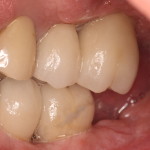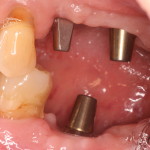Dental Implant Tissue Management
Does the type of tissue surrounding dental implants affect their long term prognosis? Previous review articles have failed to support or disprove this concept. Although many Periodontist (specialist in dental implants, gum disease, and soft tissue) have long believed that a lack of keratinized gingiva (pink tissue) around dental implants can increase inflammation and decrease prognosis. A recent article by Lin, Chan, Wang ’13 summarized the results of many research articles. They concluded based on the evidence that adequate amounts of keratinized tissue around dental implants increases overall health and therefore, increases long term prognosis.
The current patient was referred to me for evaluation of surgical treatment. After a initial exam, I determined that multiple posterior teeth were hopeless due to severe bone loss caused by chronic gum disease. The hopeless teeth were extracted, while utilizing a bone graft/lateral sinus augmentation technique. I performed this procedure to accomplish proper height and width of the alveolar ridge for future dental implant placement. After adequate healing and regeneration was accomplished, I surgically placed 3 Straumann dental implants. The implants were allowed to osseointegrate (fuse to bone). Solid Abutments were torqued into the implants, and the patient was referred to his general dentist for final restorations (see pics below).
As a board certified Periodontist “Specialist”, I enjoy focusing on a complicated surgical procedures. This allows me to treat my patients with the utmost confidence that a successful outcome will be achieved.
- Completed Dental Implant Treatment
- Dental Implants with Abutements
If you are interested in how dental implants can change your life,
Check out our Dental Implants Page.





 by
by 


